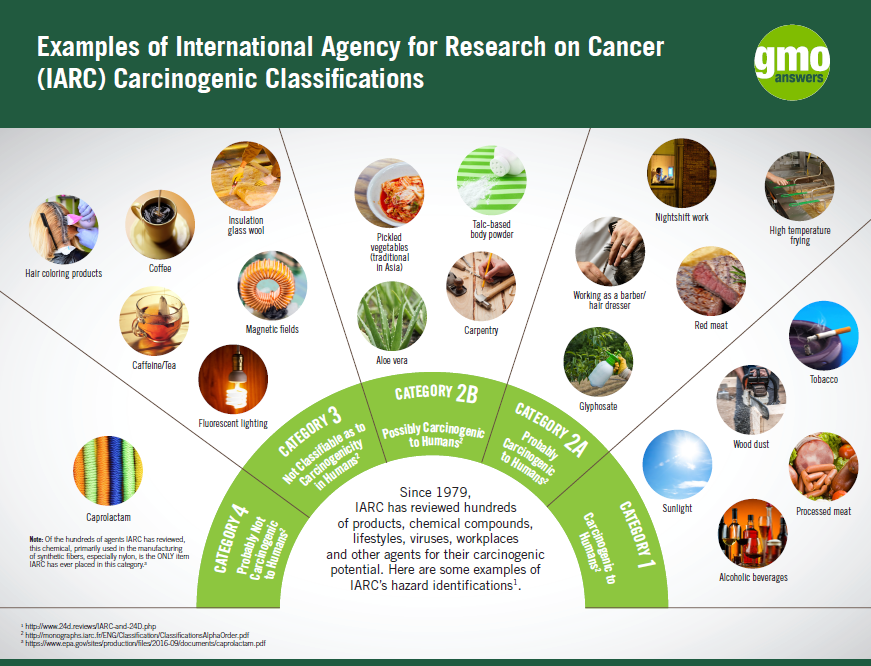Does Glyphosate cause cancer?
Glyphosate does not cause cancer.
 Over the last 25+ years, leading authorities who have evaluated hundreds of comprehensive toxicology studies and other studies from peer-reviewed journals and have concluded that glyphosate does not cause cancer. David Saltmiras, Science Fellow, Toxicology Manager of the Novel Chemistry and Microbials Product Platform, Monsanto Company, explains, “What I find quite compelling is that over the years, the volume of toxicology studies on glyphosate has grown considerably and has increased confidence in the repeated scientific conclusions on this topic.” He adds, “Between 1981 and 2009, glyphosate was tested in at least thirteen long-term/carcinogenicity studies, eight in rats and five in mice, all of which were evaluated by independent experts, who all concluded that glyphosate does not cause cancer.”
Over the last 25+ years, leading authorities who have evaluated hundreds of comprehensive toxicology studies and other studies from peer-reviewed journals and have concluded that glyphosate does not cause cancer. David Saltmiras, Science Fellow, Toxicology Manager of the Novel Chemistry and Microbials Product Platform, Monsanto Company, explains, “What I find quite compelling is that over the years, the volume of toxicology studies on glyphosate has grown considerably and has increased confidence in the repeated scientific conclusions on this topic.” He adds, “Between 1981 and 2009, glyphosate was tested in at least thirteen long-term/carcinogenicity studies, eight in rats and five in mice, all of which were evaluated by independent experts, who all concluded that glyphosate does not cause cancer.”
Since 1993, scientists from U.S. government agencies including the National Cancer Institute, in collaboration with university researchers, have studied the health impacts of farming through the Agricultural Health Study. In late 2017, these scientists published an updated look at the relationship between glyphosate use and cancers of the circulatory system. Their results from a population of over 54,000 pesticide applicators found no relationship between glyphosate and cancer.
Glyphosate does not cause cancerThe following studies, published after the International Agency for Research on Cancer (IARC) raised questions in 2015 about the carcinogenicity of glyphosate, upheld the conclusion that glyphosate is not carcinogenic to humans:
• U.S. Environmental Protection Agency (EPA), Cancer Assessment Review Committee (CARC) (2016)
“The epidemiological studies in humans showed no association between glyphosate exposure and cancer of the following: oral cavity, esophagus, stomach, colon, rectum, colorectum, lung, pancreas, kidney, bladder, prostate, brain (gliomas), soft-tissue sarcoma, leukemia, or multiple myelomas.”
• Japan Food Safety Commission (FSC) Pesticide Assessment Report, Glyphosate (2016)
“No neurotoxicity, carcinogenicity, reproductive effect, teratogenicity or genotoxicity was observed.”
• Joint FAO/WHO Meeting on Pesticide Residues (JMPR) (2016)
“Glyphosate is unlikely to pose a carcinogenic risk to humans from exposure through the diet.”
• German Federal Institute for Occupational Safety and Health Proposal for Harmonised Classification and Labeling (2016)
“No hazard classification for carcinogenicity is warranted for glyphosate according to the CLP criteria.”
• Korean Rural Development Administration (RDA) (2017)
“Moreover, it was concluded that animal testing found no carcinogenic association and health risk of glyphosate on farmers was low…A large-scale of epidemiological studies on glyphosate similarly found no cancer link.”
• European Chemical Agency (EHCA) Committee for Risk Assessment (RAC), Glyphosate’s Hazardousness Against the Criteria in the Classification, Labelling and Packaging Regulation (2017)
“RAC concluded that the available scientific evidence did not meet the criteria to classify glyphosate as a carcinogen, as a mutagen or as toxic for reproduction.”
• U.S. Environmental Protection Agency Draft Risk Assessments for Glyphosate (2017)
“The draft human health risk assessment concludes that glyphosate is not likely to be carcinogenic to humans.”
• European Union Project G-TwYST (2018)
“No toxicologically relevant effects related to the GM maize variety NK603 or the GM maize variety NK603 treated with Roundup (glyphosate) were observed.”
For more information on glyphosate and other pesticides, visit Pesticide Facts.



